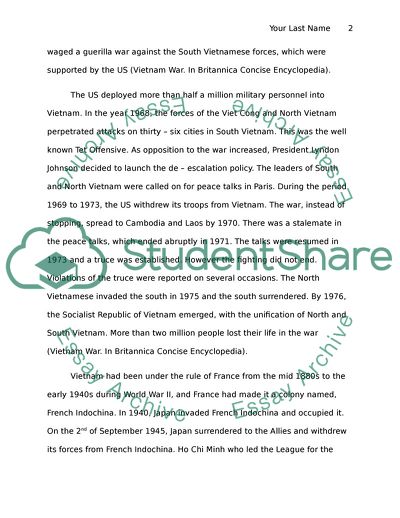Cite this document
(The American Debacle in Vietnam Essay Example | Topics and Well Written Essays - 2412 words - 2, n.d.)
The American Debacle in Vietnam Essay Example | Topics and Well Written Essays - 2412 words - 2. Retrieved from https://studentshare.org/history/1712292-how-can-we-explain-americas-involvement-in-the-vietnam-war-to-what-extent-did-america-get-it-wrong-terribly-wrong
The American Debacle in Vietnam Essay Example | Topics and Well Written Essays - 2412 words - 2. Retrieved from https://studentshare.org/history/1712292-how-can-we-explain-americas-involvement-in-the-vietnam-war-to-what-extent-did-america-get-it-wrong-terribly-wrong
(The American Debacle in Vietnam Essay Example | Topics and Well Written Essays - 2412 Words - 2)
The American Debacle in Vietnam Essay Example | Topics and Well Written Essays - 2412 Words - 2. https://studentshare.org/history/1712292-how-can-we-explain-americas-involvement-in-the-vietnam-war-to-what-extent-did-america-get-it-wrong-terribly-wrong.
The American Debacle in Vietnam Essay Example | Topics and Well Written Essays - 2412 Words - 2. https://studentshare.org/history/1712292-how-can-we-explain-americas-involvement-in-the-vietnam-war-to-what-extent-did-america-get-it-wrong-terribly-wrong.
“The American Debacle in Vietnam Essay Example | Topics and Well Written Essays - 2412 Words - 2”, n.d. https://studentshare.org/history/1712292-how-can-we-explain-americas-involvement-in-the-vietnam-war-to-what-extent-did-america-get-it-wrong-terribly-wrong.


